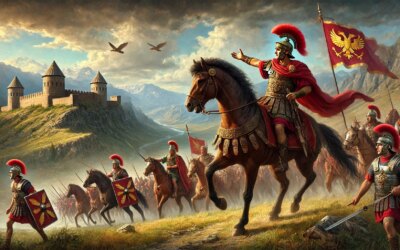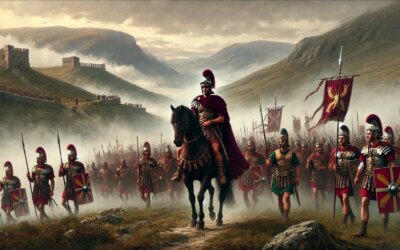Introduction: A March Toward Glory or Doom?
In the spring of 363 AD, Roman Emperor Julian led a bold campaign eastward into the heart of the Sassanid Empire. Known as “the Apostate” for his rejection of Christianity and revival of paganism, Julian was a rare figure: a philosopher on the throne, a general at war, and an emperor with an almost mystical vision of Rome’s past. His Persian expedition was meant to cement his legacy as both military leader and spiritual reformer. Instead, it ended in death, retreat, and imperial crisis.
Julian: The Unlikely Emperor
Flavius Claudius Julianus, born in 331 AD, was a nephew of Constantine the Great and a survivor of the bloody purges that followed his uncle’s death. Raised in isolation and trained in Neoplatonist philosophy, Julian emerged from obscurity to command troops in Gaul, where he earned acclaim for his victories over Germanic tribes. In 361 AD, following the death of Constantius II, he became sole emperor.
The Pagan Emperor in a Christian Empire
Julian’s reign was short but radical. He sought to restore traditional Roman religion and diminish the influence of Christianity. His policies earned him the epithet “Apostate” from later Christian historians. Though he avoided outright persecution, he removed Christians from key posts, reopened pagan temples, and tried to revive the old civic cults. His ideological mission was deeply intertwined with his political one: restoring the strength of the empire through a return to its ancient values.
The Persian Ambition
Julian’s decision to campaign against Persia was driven by both strategic and symbolic motives. The Sassanid Empire had been a persistent threat on Rome’s eastern frontier, and Julian aimed to emulate Alexander the Great by launching a swift and glorious invasion. He also saw military success as essential to validating his controversial rule and religious reforms. Preparations were meticulous, and in March 363, Julian crossed the Euphrates with over 60,000 men.
The March Through Mesopotamia
The Roman army advanced rapidly, capturing several key cities including Anbar and Ctesiphon’s outer defenses. Julian refused to besiege the heavily fortified capital, instead opting for a deeper strike into Persian territory. His troops admired his courage and shared his belief in divine favor. But supply lines grew overstretched, the summer heat intensified, and Persian resistance stiffened. The deeper the legions moved into enemy lands, the more exposed they became.
The Death of Julian
On June 26, 363 AD, during a chaotic skirmish near Samarra, Julian was struck by a spear—likely thrown by a Persian soldier. The wound was mortal. Refusing Christian priests, he allegedly uttered, “You have won, Galilean,” a reference to Christ. The phrase, whether apocryphal or not, symbolized the failure of his pagan revival. With no appointed successor, the army hastily elevated Jovian, who negotiated a humiliating peace to ensure their safe return.
Aftermath and Historical Judgment
Julian’s campaign was a tactical disaster but a philosophical odyssey. His failure marked the end of any serious attempt to restore paganism within the empire. Christian historians vilified him, while Enlightenment thinkers later praised his intellect and independence. Militarily, the Roman retreat from Persia underscored the empire’s waning power and the shifting priorities of its leadership—from conquest to survival.
Legacy of a Philosopher-General
Julian remains one of Rome’s most enigmatic emperors. Scholar, mystic, soldier, and idealist, he embodied the contradictions of a late empire torn between past and future. His Persian campaign, though doomed, revealed a rare blend of strategic boldness and personal courage. In the dust of Mesopotamia, Julian left more than a shattered army—he left a question about the destiny of empires built on ideas as much as swords.
Conclusion: The Flame That Briefly Burned
Julian’s invasion of Persia in 363 AD was a venture steeped in ambition, symbolism, and philosophical fervor. It stands as one of the last great campaigns of a united Roman Empire, a flicker of classical valor before the long twilight of antiquity. Though he died far from Rome, his story endures as a testament to the complex legacies of emperors who sought to shape not only history, but eternity.






